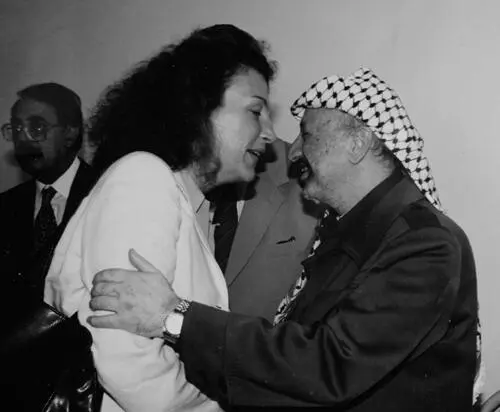Before that, such activities meant ostracism. Now, with young teenagers controlling the streets and talking of purifying the Palestinian community, they are life-threatening. About 200 Palestinians have been killed for collaboration or prostitution.
But although Nina warned her daughter she was endangering the family, there was little a mother could do. ‘Their love was burning. Avi was crazy about her and she lost her head.’ The young couple would return together in broad daylight after nights of passion in Marek’s jeep and Mattar would bring him coffee before he returned to his unit.
The family began to receive threats and Marek made things worse. He and his unit began picking up local teenagers and beating them. Nina says she thinks he was trying to show off to her daughter.
Desperate, Nina complained to the police and sent word to Marek’s Israeli wife. The police ignored her but his wife came down and staked out the house in the Arab village. When Marek and Mattar returned, she ran out into the street with a kitchen knife. Mattar made off in his jeep but the story was too public to be kept quiet.
The military suspended Marek. Mattar found a mongrel dog hanging in the family toilet, dead, its head in the water. She quickly left town. Publicity about the case has made it the gossip of Israelis as well as Palestinians.
Mattar says she and Marek plan to marry after they both divorce. She says she will convert to Judaism. ‘I can’t go back to live among the Arabs,’ she said. But she is worried that Marek’s return to Israel may change him. He has been heavily criticised in the Hebrew press.
Marek now faces a military tribunal to explain the liaison. His defence is that he was only fraternising with Mattar in a patriotic endeavour to recruit her as a spy. At the moment observers are not betting on a happy ending to the tale.

Desperately seeking answers in the Arafat slipstream: Yasser Arafat
5 June 1990
The Times
When people know you have spent a year making a film about Yasser Arafat, the question they ask most often is ‘Were you ever afraid?’ At times I felt frustrated, angry, despairing and very tired, but not afraid. In his manner, Arafat is one of the less threatening people you are likely to meet.
Making a documentary of him takes endurance, not courage. We had flown into Tunis for a scheduled interview to begin our filming. But Arafat was in Baghdad. The film opens with a Tunis to Baghdad telephone call. It is 2am and Arafat seems to think the only way we can get a connection in Baghdad in time to meet him is to find a boat to Paris. We agree instead to fly separately to China where he is due for a state visit, then fly back together in his borrowed Iraqi jet.
This scene must cause great pain to BBC accountants. But at the time it seemed the ideal trip. We would film behind the scenes in an exotic location while the terrorist-turned-statesman wheeled and dealed, then have him as a captive interviewee for the hours it took to fly back to the Middle East. The latter was the most alluring. Arafat grows bored in interviews and will often stand up, unclip his microphone and thank you as he walks out.
But the Chinese Foreign Ministry called Arafat while we were somewhere over Pakistan and said: ‘We cannot receive you, the students are causing trouble.’ We headed back to Tunis, arriving in time to board his borrowed Iraqi jet and set off to the summit in Casablanca. But the China trip did pay off. Arafat takes everything personally. Had we decided not to go it would have signalled a lack of commitment, however well-founded our misgivings.

Marie with Yasser Arafat, c. 1994.
When we finally caught up with him, he owed us one. We were instantly famous in PLO ranks as the crew that had gone to Peking to see the ‘Old Man’ and been stood up. Everyone had a similar tale; this time it was not Arafat’s fault, but it usually is. People around him, a travelling entourage that is both family and staff, began helping with tips on the etiquette of living alongside him. One of my journal entries notes a word of advice from a senior aide: ‘When I break your foot, you have gone wrong.’
Arafat’s schedule is exhausting and it wears down everyone around him. Half the hotels in Tunis seem to be filled with people waiting to see Arafat. Fighters with blood rivalries meet in the lobby of the Hilton and turn their backs. Arafat maintains his own rigid personal organisation within the chaos around him. Days are for seeing to problems such as parents seeking university tuition for their children. Serious business takes place at night, dating from the time the PLO was an underground organisation. Meetings begin about 9pm and rarely end before 3am. Everyone is expected to be at Arafat’s call.
He never tells anyone, even close aides, his schedule in advance for security reasons. When you fly with him you do not know your destination until you take off. Asking a simple question at breakfast such as ‘What are you doing today?’ brings startled stares from aides and silence from Arafat.
The PLO is Arafat’s life and he expects the same commitment from everyone around him. He accepts planes and villas from Arab leaders, but remains a nomad and just out of their control. All his villas look the same – sterile, furnished with a print or two of Jerusalem, a television, some nondescript sofas and a desk. The head of the Palestinian government travels in four suitcases: one for his uniforms, one for his fax machine, one for ‘in’ and ‘out’ faxes and one for a blanket to curl up in for cat naps.
His obsessive precision can be maddening. He arranges his keffiyeh headdress meticulously every day in the same way. It must hang down his shoulder in the shape of the map of Palestine. He empties his machinegun pistol precisely as his jet takes off, carefully lining up the bullets on his tray. He marks every single fax sent to the PLO with a felt-tip red pen. But doubts begin to set in when one spends a lot of time around him. Does Arafat really have to read every single fax? Does he have to control every disbursement of funds, the purchase of an office desk in Singapore? It is Jimmy Carter as PLO leader.
Arafat is up on every detail of running the organisation, but never takes time to review policy, listen to advice or plan ahead. The PLO is run from moment to moment from Arafat’s head. The main criticism one hears in the ranks of the PLO is of this autocratic style. Arafat brooks no criticism and, as a result, many educated and independent Palestinians have opted out.
Now, when he desperately needs good advice on the workings of the western world as he tries to convince it that he is sincere in his current drive for a peaceful settlement with Israel, few around him know its ways. He himself is unsophisticated about the West, not surprisingly, as he spent most of his youth organising a resistance movement and has been banned from most of it for his adult life.
So why do Palestinians follow this unlikely leader? In person, Arafat is warm and inspires devotion. Palestinians who disagree with his views respect his devotion to the cause. He has always managed to compromise and lead by finding the highest common denominator within the fractious Palestinian movement. Arafat has no political ideology. He wants one thing: to liberate the homeland of his people. He has become more than a leader. For most Palestinians he is a symbol of their aspirations.
Читать дальше














